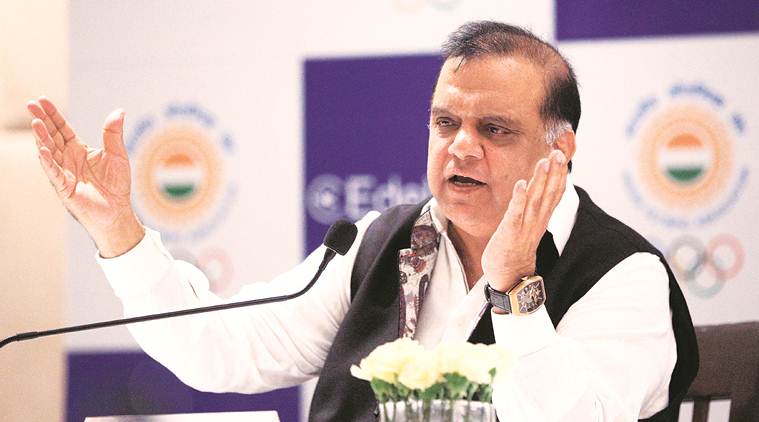The sports ministry shared the draft of the NCGGS with the sports federations on October 7 and later set November 10 as the deadline to submit feedback.
The Indian Olympic Association has opposed the proposal to restrict the age limit of office-bearers in National Sports Federations (NSFs) to 70 years and ‘strongly objected’ to the exclusion of state Olympic Associations from the IOA as per the draft National Code for Good Governance in Sports (NCGGS) 2017.
In its feedback submitted to the sports ministry on Sunday, the IOA also disapproved of the provision in the draft code for the government to nominate or constitute an Athletes’ Commission, arguing they are ‘duty bound to protect autonomy of sports federations’, while seeking clarity on a clause pertaining to exemption from revealing details about commercial contracts under the Right to Information Act.
The sports ministry shared the draft of the NCGGS with the sports federations on October 7 and later set November 10 as the deadline to submit feedback. In the meantime, the ministry has relegated the code to the back-burner and it has been suggested that a new committee be formed to have a re-look at the proposed draft. However, no timeline has been set for the formation of the panel as well as redrafting the code.
The federations and ministry were earlier at the loggerheads following the proposal in the NCGGS that no minister, MP, MLA or government servant shall be an office-bearer or board member of a federation. However, sports minister Kiren Rijiju had said after meeting the NSFs that the government would be open to relaxing this clause.
The IOA, sources said, submitted its feedback to ensure their suggestions and objections are taken into consideration when the new committee meets to re-draft the code.
It has been proposed in the code that a member will be ‘disqualified’ after ‘attainment of the age of 70 years’. The IOA, however, has argued that even though the norm is in sync with the Olympic Charter, the International Olympic Committee has not enforced it on all International Federations.
Instead, the IOA has proposed that every NSF be allowed to follow the age limit of their respective international federation, or a uniform age limit of 75 be imposed. “Considering the longevity of a person’s term at the IOC, the rule of relieving membership at the age of 70 years is optimal for the IOC. But given the differences in the membership and governance structure between the IOC and NOC (National Olympic Committee), that rule of age limitation cannot be implemented in toto for all members on the Board in the NOC. If there has to be a limitation, 75 years proposed as the age limit,” the IOA said.
It added: “The NSFs should be permitted to follow the age limit as per the governance principle of the respective IF. Besides, there is no law of the land that limits the age of a person for honorary service in a society or non-profit organisation.”
The draft – which states that the IOA and federations ‘shall be deemed to be a public authority’ – exempts the bodies from revealing commercial details under the RTI Act. The IOA has raised doubts over the move and questioned if it contradicts the provisions under the Act. “The doubt is whether this contradicts the provision in the Right to Information (RTI) Act, whereby the Public Information Officer (PIO) cannot deny information citing commercial confidence for agreements between a public authority and private party,” the IOA has pointed out.
The sports code was first formulated in 2011. It spelt out election procedures, age and tenure norms for office-bearers and brought federations under the RTI Act, among other decisions. However, it was argued in 2014 that some of the points in the code were not updated as per the requirements of modern-day sport.
Consequently, on the direction of the Delhi High Court, the ministry re-constituted a panel that revised the sports code in 2017. However, due to various complications, it has not yet been enforced.
Source: Read Full Article


